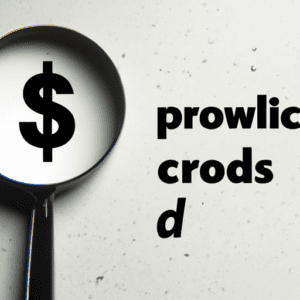In today's competitive job market, having a strong freelancer portfolio can make all the difference. It's not just about showcasing your skills and expertise; it's about capturing the attention of potential clients and demonstrating why you are the best fit for their project. With countless freelancers vying for the same opportunities, it's important to stand out from the crowd and leave a lasting impression. In this article, we will explore the key elements of building a strong freelancer portfolio that will make you shine and attract the attention you deserve. From selecting the right projects to highlighting your achievements, we've got you covered. Get ready to take your freelance career to the next level with our expert tips and tricks!

Choosing the Right Projects
Define your niche
When it comes to building a strong freelancer portfolio, it is essential to define your niche. By identifying a specific area of expertise or industry, you can position yourself as an expert in that field. This not only helps you attract the right kind of clients but also allows you to focus on projects that you are truly passionate about. Defining your niche helps you establish a unique selling proposition and sets you apart from other freelancers.
Select relevant projects
Once you have defined your niche, it is important to select projects that are relevant to your area of expertise. When potential clients visit your portfolio, they want to see examples of your previous work that align with their needs. By showcasing projects that are relevant to your niche, you demonstrate your ability to deliver high-quality results in their specific industry. This helps build trust and credibility with potential clients, increasing your chances of landing new projects.
Consider ongoing work
While showcasing past projects is crucial, including ongoing work in your portfolio can greatly enhance its credibility. Clients want to see that you are actively engaged in your field and are consistently producing results. By demonstrating ongoing projects, you highlight your ability to maintain long-term working relationships and your commitment to delivering value over time. Additionally, ongoing work can help you attract potential clients who are looking for freelancers with availability for future projects.
Showcasing Your Best Work
Select a variety of projects
When showcasing your best work in your freelancer portfolio, it is important to select a variety of projects that showcase your range of skills and expertise. Including a diverse set of projects demonstrates your versatility as a freelancer and proves that you can handle different types of work. By showing potential clients that you are not limited to a specific style or industry, you increase your chances of appealing to a wider range of clients.
Highlight your expertise
While including a variety of projects is essential, it is equally important to highlight your expertise in your portfolio. This means selecting projects that align with your strengths and skills, and showcasing them prominently. By focusing on projects that you have excelled in, you demonstrate your ability to deliver exceptional results in those specific areas. This helps potential clients understand the value you can bring to their projects and increases their confidence in hiring you.
Include your process
In addition to showcasing your best work, it is beneficial to include information about your process in your freelancer portfolio. Clients are not only interested in the end result but also want to understand how you approach and execute projects. By detailing your process, you provide transparency and insight into your work methodology. This helps potential clients gauge whether your approach aligns with their expectations and increases their confidence in your ability to deliver successful outcomes.
Creating a Professional Website
Choose a platform
Creating a professional website is crucial for promoting your freelancer portfolio. When choosing a platform for your website, consider factors such as ease of use, customization options, and compatibility with your portfolio content. Look for platforms that offer templates specifically designed for freelancer portfolios, as they often include features that enhance the showcase of your work. Some popular options include WordPress, Squarespace, and Wix.
Design a clean layout
When designing your freelancer website, opt for a clean and visually appealing layout. The purpose of your website is to showcase your skills and expertise, so it is important to present your work in an organized and visually appealing manner. Use a consistent color scheme, fonts, and imagery that align with your brand identity. Pay attention to the placement of your portfolio items and ensure they are easy to navigate and browse.
Optimize for mobile devices
In today's digital landscape, it is essential to optimize your freelancer website for mobile devices. With a growing number of users accessing the internet through their smartphones and tablets, having a responsive website ensures that your portfolio is easily accessible to potential clients on any device. Test your website on different screen sizes and ensure that it loads quickly and looks aesthetically pleasing on mobile devices.
Crafting Compelling Project Descriptions
Focus on outcomes
When crafting project descriptions for your freelancer portfolio, focus on the outcomes and results you achieved for each project. Potential clients are interested in seeing the value you can bring to their own projects, so highlighting the positive impact you had on previous clients' businesses or organizations is essential. Include metrics or specific examples whenever possible to demonstrate the tangible benefits of your work.
Highlight key skills used
In addition to focusing on outcomes, make sure to highlight the key skills you used in each project. By explicitly mentioning the skills and expertise you utilized, you give potential clients a clear understanding of the capabilities you bring to the table. This not only helps them assess whether you are the right fit for their projects but also positions you as an expert in those specific areas.
Use powerful language
When describing your projects, use powerful and persuasive language to captivate potential clients. This means carefully selecting words that convey the impact and value of your work. Avoid generic and overused terms, and instead choose descriptive language that paints a vivid picture of your achievements. By utilizing powerful language, you make a stronger impression on potential clients and persuade them to consider working with you.
Leveraging Testimonials and Reviews
Request feedback from clients
One effective way to showcase your skills and expertise is by including testimonials from satisfied clients in your freelancer portfolio. After completing a project, make it a practice to request feedback from your clients. Their testimonials can be powerful tools for attracting potential clients and building credibility. Reach out to clients via email or a feedback form and ask them to briefly share their experience working with you.
Include positive testimonials
Once you have gathered testimonials from satisfied clients, include them strategically in your freelancer portfolio. Choose testimonials that highlight the unique value you brought to each project and showcase your strengths as a freelancer. Displaying positive testimonials prominently on your website helps potential clients see the positive impact you have had on previous clients and increases their confidence in your abilities.
Encourage clients to leave reviews
In addition to testimonials, encouraging clients to leave reviews on platforms such as Google, Yelp, or specialized freelance marketplaces can further enhance your online presence. Positive reviews can significantly influence potential clients' decisions, as they provide unbiased feedback from individuals who have worked with you. Include links to review platforms on your website or in follow-up emails to make it easy for clients to leave reviews.
Demonstrating Your Expertise through Blogging
Write informative blog posts
Blogging is an effective way to demonstrate your expertise and attract potential clients to your freelancer portfolio. Write informative blog posts related to your niche or industry, providing valuable insights and tips. Focus on topics that are relevant and engaging to your target audience, showcasing your knowledge and positioning yourself as a thought leader in your field. Regularly update your blog to maintain an authoritative online presence.
Share industry insights
In addition to informative blog posts, sharing industry insights can further establish your expertise and relevance. Keep up with the latest trends and developments in your niche and share your thoughts and analysis with your audience. This not only demonstrates your knowledge and understanding of your industry but also keeps your blog content fresh and engaging. Sharing industry insights helps potential clients see the value you bring beyond your portfolio projects.
Show your thought leadership
Through blogging, you have the opportunity to showcase your thought leadership and unique perspective on relevant topics. Offer original ideas, fresh perspectives, and unique solutions to common challenges in your industry. By consistently demonstrating your thought leadership, you build trust and credibility with potential clients, positioning yourself as an expert they can rely on for innovative and effective solutions.

Including Relevant Certifications and Training
List your certifications
Listing relevant certifications in your freelancer portfolio is a powerful way to showcase your expertise and credentials. Include certifications that are directly related to your niche or industry, as they provide concrete proof of your skills and knowledge. Display your certifications prominently on your website and provide brief descriptions of each certification to give potential clients a clear understanding of your qualifications.
Highlight relevant training
In addition to certifications, highlight any relevant training you have completed. This can include workshops, courses, or specialized programs that add depth to your skillset. By showcasing your commitment to ongoing professional development, you demonstrate your dedication to staying updated and improving your skills. Potential clients appreciate freelancers who invest in their own growth and will be more inclined to trust your abilities.
Show ongoing professional development
Demonstrate your ongoing professional development by mentioning any current training or educational pursuits in your freelancer portfolio. This could include workshops or courses you are currently enrolled in, as well as industry conferences or events you plan to attend. By showcasing your commitment to continuously improving your skills and knowledge, you position yourself as a freelancer who is always up-to-date with the latest trends and best practices.
Optimizing Your Online Presence
Optimize your website for SEO
To maximize your visibility and attract potential clients to your freelancer portfolio, it is crucial to optimize your website for search engine optimization (SEO). Conduct keyword research to identify relevant keywords and phrases that potential clients might use when searching for freelancers in your niche. Incorporate these keywords naturally into your website content, including your portfolio descriptions, blog posts, and page titles. This helps search engines index your website and increases your chances of ranking higher in search results.
Maintain an active social media presence
Having a strong online presence goes beyond just a freelancer website. Social media platforms can play a significant role in showcasing your skills and attracting potential clients. Choose the platforms that are most relevant to your niche and target audience, such as LinkedIn, Facebook, Instagram, or Twitter. Regularly post updates related to your work, share industry news, engage with your audience, and promote your blog posts or portfolio projects. Maintaining an active social media presence helps you connect with potential clients and build your personal brand.
Engage with online communities
Engaging with online communities in your niche is a valuable way to demonstrate your expertise and connect with potential clients. Join relevant forums, industry groups, or online communities where your target audience congregates. Share your knowledge, answer questions, and provide valuable insights. By actively participating in these communities, you build relationships, establish credibility, and increase your visibility within your industry.
Networking and Collaborating with Other Freelancers
Attend industry events and meetups
Networking with others in your industry is an effective way to expand your professional network and collaborate on projects. Attend industry events, conferences, or meetups where you can meet fellow freelancers, potential clients, and industry professionals. Engage in conversations, exchange business cards, and follow up with potential collaborators. Networking not only helps you establish valuable connections but also increases your chances of being recommended for projects by fellow freelancers.
Join online freelancer communities
In addition to offline networking, joining online freelancer communities can provide opportunities for collaboration and professional growth. Platforms such as LinkedIn groups, freelance marketplaces, or specialized forums host communities of freelancers from various industries. Participate actively, share your expertise, and contribute to discussions. By networking online with other freelancers, you can form valuable partnerships, exchange referrals, and collaborate on larger projects.
Collaborate on projects
Collaborating with other freelancers can significantly enhance your portfolio and showcase your ability to work effectively in a team. Seek out opportunities where you can collaborate on projects that complement each other's skills and expertise. By showcasing successful collaborations in your portfolio, you demonstrate your flexibility, teamwork, and ability to deliver exceptional results as part of a collaborative effort. Collaborations can also lead to larger and more complex projects that individual freelancers may not have the capacity to handle.
Updating and Refreshing Your Portfolio
Regularly add new projects
To keep your freelancer portfolio fresh and engaging, it is important to regularly add new projects to showcase your latest work. By continually updating your portfolio with recent projects, you demonstrate that you are actively working and progressing in your field. When adding new projects, ensure they align with your niche and highlight your skills and expertise. This helps keep potential clients engaged and interested in your work.
Remove outdated work
While it is important to showcase a variety of projects, it is equally important to remove outdated work from your freelancer portfolio. Over time, as your skills and style evolve, some older projects may no longer accurately represent your current capabilities. Regularly review your portfolio and remove any projects that no longer align with your niche or meet your current standards. This ensures that your portfolio remains focused and relevant, and presents potential clients with a clear and accurate representation of your abilities.
Keep your portfolio up-to-date
In addition to regularly adding new projects and removing outdated work, make it a habit to consistently update your freelancer portfolio with any changes or updates to your professional information. This includes updating your contact details, certifications, training, and any significant achievements or recognitions. By keeping your portfolio up-to-date, you demonstrate professionalism and attention to detail, increasing your credibility with potential clients.
Building a strong freelancer portfolio takes time, effort, and attention to detail. By carefully selecting projects that showcase your expertise, designing a professional website, crafting compelling project descriptions, leveraging testimonials, demonstrating your expertise through blogging, including relevant certifications and training, optimizing your online presence, networking with other freelancers, and regularly updating your portfolio, you can build a powerful portfolio that captures the attention of potential clients and helps you showcase your skills and expertise effectively.





